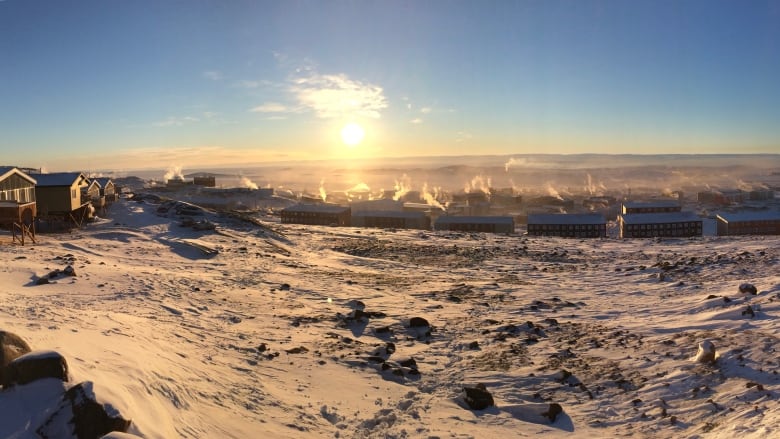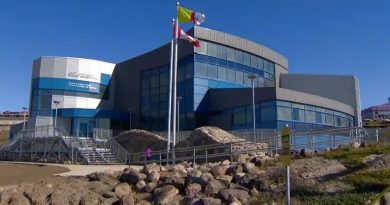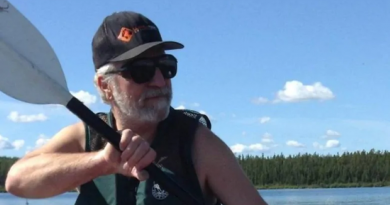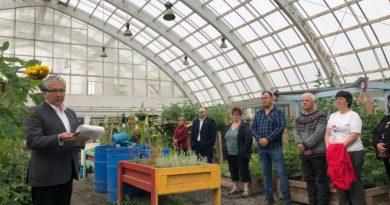Officials confirm COVID-19 outbreak in arctic Canadian city of Iqaluit

12 new cases reported in the city Friday
Nunavut’s Chief Public Health Officer Dr. Michael Patterson declared a COVID-19 outbreak in Iqaluit.
Iqaluit has 13 active cases of COVID-19 as of Friday, according to the government of Nunavut.
The city confirmed its first case Wednesday night and 12 more cases were announced Friday morning.
Patterson declared an outbreak in Iqaluit due to these new cases, but he said Friday there isn’t yet evidence of community transmission. Community transmission exists when public health cannot link all positive cases.
So far, all of Iqaluit’s cases have been identified through the contact tracing process, but Patterson says there are some steps missing in the chain.
The cases involve multiple households and the source of the virus has not yet been determined, Patterson said.
Patterson also cautioned against blame as he said those who’ve tested positive work different jobs, have different backgrounds and circumstances.
Premier Joe Savikataaq said he expects the case count in Iqaluit to rise further at a new conference Friday morning.
He asked Iqaluit residents to stay home, get vaccinated if they haven’t already and to only socialize with their household, even outside on the land.
If the lockdown continues for an extended period, Patterson said some modifications to the rules may be made to allow people to live alone to have some socialization.
Essential worker exemption safe, necessary, health minister says
Health Minister Lorne Kusugak encouraged Nunavummiut to be kind. He reminded the public that Nunavut has gone over a year with the exemption from isolation for essential workers without a positive case.
Kugusak said the territory needs its essential workers to provide critical services and maintain Nunavut’s infrastructure.
Right now, he says the public health team is examining the process to see if it could be made safer, but no gaps have been identified yet.
Wednesday’s case is an essential worker who did not have to isolate before entering the territory.
However, the person has been in Iqaluit more than two weeks, which Patterson says may mean they contracted the virus while in Iqaluit.
Essential workers are not allowed to go anywhere but work and a weekly trip to the grocery store until they’ve been in the territory longer than two weeks. They are not tested unless they begin to show COVID-19 symptoms, Patterson said on Thursday.
As of Friday, the Nunavut government had identified more than 70 close contacts of the positive cases.
When asked if any of the identified contacts have left Iqaluit, Patterson said a few contacts have left Iqaluit to the South. He did not name any Nunavut communities.
Storehouse bar exposure risk
The Nunavut government also issued a possible COVID-19 exposure notice for Iqaluit. Anyone who was at Storehouse Bar and Grill on or after April 8 is asked to monitor for symptoms for 14 days after their last visit. If symptoms do develop, people should immediately self-isolate for 14 days and contact the COVID-19 hotline at 1-888-975-8601 to book a test.
The hotline has been allocated more staff to respond to calls, but was experiencing technical problems Friday morning.
Patterson said the risk is low, which is why the ask is to self-monitor, not self-isolate.
The timeframe is broad in the announcement because Patterson says multiple people who were contagious visited the Storehouse bar, multiple times during their infectious period.
On every one of the days from April 8 to April 14 there was an infectious person in the building.
Patterson said public health has not been able to identify every person who was in contact with those people, which is why the public announcement was made.
Anyone who has travelled outside of Iqaluit since April 7 is also asked to immediately self-isolate for 14 days.
Testing plans
Anyone being admitted to Iqaluit’s Qikiqtani General Hospital is being tested for COVID-19, Patterson said.
Over the next few days public health will determine if testing at high risk populations makes sense, he said.
Contact tracing will begin around any positive case and is public health’s current focus. They will ask about a person’s vaccination status.
Patterson said Nunavut has more than 20,000 swabs and transport vials for completing COVID-19 tests. The territory also has two testing machines: the BioFire machine and the GeneXpert which combined can process 200 tests a day.
However, testing at that capacity requires some other hospital tests to be put on hold, so that speed is not sustainable in the long term, he said.
Nunavut already has the doses it needs to vaccinate 75 per cent of its adult population, so clinics will continue despite Moderna delivery delays in Canada.
Starting Monday, rotational workers will be able to contact their local health centre and book an appointment for the vaccine as well.
Three-layer cloth masks or medical masks are what Patterson recommends.
The Nunavut Impact Review Board hearings into Baffinland’s Phase 2 expansion at the Mary River Mine have been suspended. The board is currently working to send delegates home, where they will have to isolate for two weeks.
Related stories from around the North:
Canada: Arctic Tourism & the Pandemic podcast, Eye on the Arctic
Finland: Mysterious coronavirus variant in Arctic Finland is rare US-Mexican strain, Yle News
Denmark/Greenland: Greenland authorities buoyed by high demand for COVID-19 vaccine, Eye on the Arctic
Iceland: With tougher border rules appearing to work, Iceland to relax some domestic restrictions, Eye on the Arctic
Norway: Norway extends border closure with Finland due to pandemic, The Independent Barents Observer
Russia: Norway closes borders over fears of virus, but exempts Russian fishermen from severely infected border region, The Independent Barents Observer
Sweden: COVID-19 strategy darkens Sweden’s image in the Nordics, Radio Sweden
United States: Alaska politicians send Trudeau letter saying they’re “shocked” over Canada’s COVID-19 cruise ship ban, Eye on the Arctic



